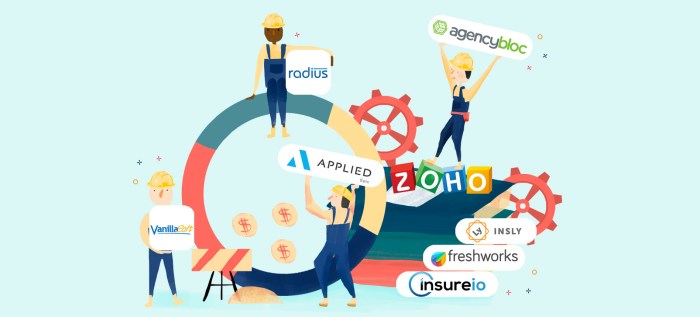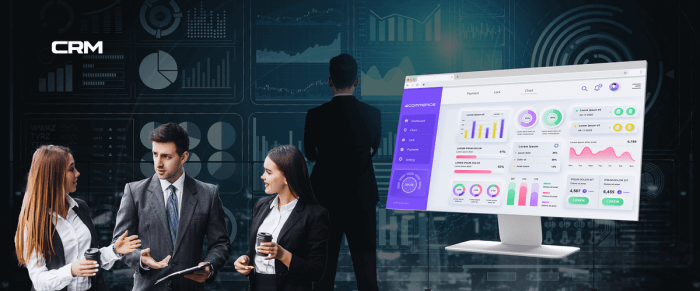Crm with accounting software – In today’s dynamic business landscape, efficient management of customer relationships and financial data is paramount. Integrating Customer Relationship Management (CRM) software with accounting software offers a powerful synergy, streamlining operations and driving significant improvements in productivity and profitability. This comprehensive guide explores the benefits, features, and considerations of combining these crucial business tools.
Understanding the Synergy: CRM and Accounting Software Integration
Traditionally, CRM and accounting systems operated as separate entities. This often led to data silos, manual data entry, and inconsistencies across departments. Integrating these systems eliminates these issues, creating a unified platform for managing both customer interactions and financial transactions. This integration allows for a seamless flow of information, improving accuracy, reducing errors, and providing a holistic view of the business.
Key Benefits of CRM and Accounting Software Integration, Crm with accounting software
- Improved Data Accuracy: Automated data transfer eliminates manual entry, minimizing human error and ensuring data consistency across both systems.
- Enhanced Efficiency: Streamlined workflows reduce the time spent on administrative tasks, freeing up valuable time for strategic initiatives.
- Better Financial Reporting: Accurate and timely financial reports provide a clear picture of the business’s financial health, enabling informed decision-making.
- Improved Customer Relationship Management: A complete customer profile, including financial history, allows for personalized service and targeted marketing campaigns.
- Increased Sales and Revenue: By understanding customer behavior and financial standing, businesses can optimize sales strategies and increase revenue.
- Reduced Operational Costs: Automation reduces the need for manual processes and minimizes errors, leading to significant cost savings.
- Better Inventory Management: For businesses selling products, integration can provide real-time inventory data, improving order fulfillment and reducing stockouts.
- Improved Forecasting and Budgeting: Accurate financial data allows for more precise forecasting and budgeting, enabling better financial planning.
Features to Look for in Integrated CRM and Accounting Software
When choosing integrated CRM and accounting software, consider the following key features:
Essential Features:
- Two-way data synchronization: Real-time data synchronization ensures that both systems always reflect the most up-to-date information.
- Automated invoice generation: Automatically generate invoices directly from customer interactions within the CRM, eliminating manual data entry.
- Payment processing integration: Seamlessly process payments through the integrated system, reducing reconciliation efforts.
- Customer relationship tracking: Maintain a complete history of customer interactions, including sales, support, and payment information.
- Reporting and analytics: Access comprehensive reports and dashboards providing insights into customer behavior, sales performance, and financial health.
- Customizable workflows: Tailor the system to your specific business processes and needs.
- Scalability: Ensure the software can adapt to your business’s growth and changing requirements.
- API Integrations: Look for software with open APIs to allow for integration with other business applications.
- Security and Data Protection: Robust security measures are essential to protect sensitive customer and financial data.
Choosing the Right CRM and Accounting Software Integration
Selecting the right integrated solution depends on your specific business needs and budget. Consider factors such as:
- Business size and complexity: Smaller businesses may require simpler solutions, while larger enterprises may need more robust and scalable systems.
- Industry-specific requirements: Certain industries have unique needs that require specialized software features.
- Integration capabilities: Ensure the software integrates seamlessly with your existing systems.
- Cost and pricing models: Evaluate different pricing models (subscription, one-time purchase) to find the best fit for your budget.
- Vendor support and training: Choose a vendor that offers excellent customer support and training resources.
Common CRM and Accounting Software Integrations: Crm With Accounting Software
Many popular CRM and accounting software solutions offer integration capabilities, either directly or through third-party apps. Some examples include:
- Salesforce and Xero: A popular combination offering robust CRM functionality with streamlined accounting.
- HubSpot and QuickBooks: Another widely used pairing, providing a comprehensive marketing and sales platform integrated with accounting.
- Zoho CRM and Zoho Books: A fully integrated suite from Zoho, offering a streamlined experience for businesses using both CRM and accounting.
Addressing Potential Challenges
While the benefits of integration are significant, there are potential challenges to consider:

Source: crmrank.com
- Implementation Complexity: Integrating systems can be complex and require technical expertise.
- Data Migration: Transferring existing data from separate systems can be time-consuming and require careful planning.
- Cost of Implementation: The initial cost of implementation, including software licensing, customization, and training, can be substantial.
- Integration Compatibility: Ensuring compatibility between different software systems is crucial for a successful integration.
Frequently Asked Questions (FAQ)
- Q: What are the benefits of integrating CRM and accounting software?
A: Integration offers improved data accuracy, enhanced efficiency, better financial reporting, improved customer relationship management, increased sales and revenue, and reduced operational costs.
- Q: How much does CRM and accounting software integration cost?
A: The cost varies significantly depending on the software chosen, the complexity of the integration, and the level of customization required.
- Q: What are some examples of integrated CRM and accounting software?
A: Popular examples include Salesforce and Xero, HubSpot and QuickBooks, and Zoho CRM and Zoho Books.
- Q: Is CRM and accounting software integration suitable for all businesses?
A: While beneficial for most businesses, the suitability depends on size, complexity, and specific needs. Smaller businesses may find simpler solutions sufficient.
- Q: What are the potential challenges of CRM and accounting software integration?
A: Potential challenges include implementation complexity, data migration, cost of implementation, and integration compatibility.
Conclusion
Integrating CRM and accounting software offers a powerful way to streamline operations, improve efficiency, and drive business growth. By carefully considering your business needs, choosing the right software, and addressing potential challenges, you can unlock the significant benefits of this powerful combination. Start exploring options today and transform your business processes for enhanced success.

Source: digitalmanager.pk
References
Call to Action
Ready to streamline your business operations and unlock the power of integrated CRM and accounting software? Contact us today for a free consultation to discuss your specific needs and find the perfect solution for your business!
User Queries
What are the benefits of integrating CRM and accounting software?
Improved data accuracy, reduced manual data entry, enhanced financial reporting, better customer insights, streamlined operations, and improved decision-making.
What types of businesses benefit most from this integration?
Businesses of all sizes can benefit, but those with complex sales processes, multiple revenue streams, or a large customer base will see the most significant improvements.
How much does CRM with accounting software integration cost?
Costs vary greatly depending on the chosen software, the size of the business, and the level of customization required. It’s best to obtain quotes from various vendors.
What are some common challenges associated with integrating CRM and accounting software?
Data migration, system compatibility issues, and the need for employee training are common challenges.

Source: medium.com
Is it difficult to implement CRM with accounting software?
The difficulty varies depending on the complexity of the systems and the business’s existing infrastructure. Professional assistance may be beneficial for seamless implementation.
